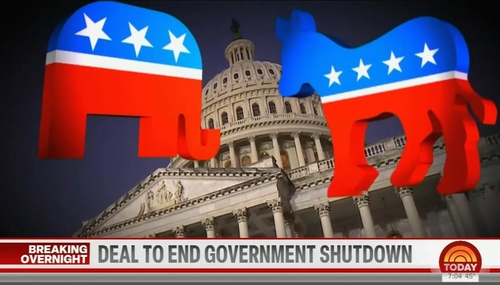Ted Koppel did a long interview with Charlie Rose on PBS Monday night, a day before he retired as host of "Nightline." One segment of the interview that stuck out was their discussion of racism and racial inequality and how passionate they are about it. Koppel said it "just infuriates" him. Rose agreed:
Rose: Regrets about this "Nightline" thing in terms of – where you think, God, I missed it that day, I didn't go, or we talked about if we could have been tougher, raised better questions about war and peace with respect to Iraq, should they have waited, all of that, and questions -- You and I share another passion which is the passion about race and civil rights in america.
Koppel: Right.
Rose: There are things we don’t necessarily have the same -- You have more of a passion about prisons and prison reform than I do. I may be more curious about books than you are or something. I don't know. But tell me about race and how do you feel about it as a defining curiosity and interest of your life?
Koppel: It's more than a curiosity. I've told a number of African-American friends, I cannot imagine what it must be like to be an African-American in this country. I cannot, I mean, it's the little insults and slights, the sometimes unintended offense that is given. And something that you really have to learn from earliest childhood on. There's just a certain amount of crap that you are going to learn to put up with if you are going to grow up black in this country. It's just going to happen to you. We have made huge progress, I understand that. We've made huge progress in the time that you and I have been alive. And it's a better country today in terms of race relations than probably it has ever been before.
Nevertheless, just -- there's a sociology professor out on Long Island, does an experiment with his class every year. He comes in and says okay, folks, just sort of bear with me. As of five minutes from now, all of you are African-American. All of you. This happened because a giant corporation that I happen to represent, huge multibillion dollar corporation, made a mistake. Be that at as it may, you are all now African-American. The corporation wants to do the right thing by you. How much is it worth for you. For the rest of your life you're going to be black. What do you want in compensation? The kids start, a million dollars, $10 million, $50 million. And then he begins to analyze with them why? What is it that makes you feel that if a white man like you suddenly tomorrow were black and it was somebody else's fault that that happened, that they would owe you money? Interestingly by looking at it that way, he is able to get past all the sort of easy defenses we put...
Rose: We instinctively know.
Koppel: We know in our heart of hearts that life would be different. That life would be more difficult for us. There would be certain benefits that we now enjoy that we might not enjoy. That just infuriates me.
Rose, quietly: Me too.
I've Googled a little bit trying to find this little thought experiment. (If anyone finds it, post a message.) But it seems to me that when you come to students and give THEM the notion, "I'm sorry, you're now black. How much money do you want? I'm a major corporation," they're going to answer the question by thinking like most calculating humans: hey, how much schmundo can I get out of these people? They think about it instinctively as a cash-in opportunity. I doubt they're thinking "I hate blacks so much that I'm so injured to be one." Or "blacks have it so rough in racist America that I require compensation." Look at the way the professor sets them up.
This reminds me of a dopey game one of my high school teachers played with us, a game called Star Power, I believe, in which we all drew a certain number of chips, and the people with the most chips got to make all the society's rules. Lesson: we don't have a real democracy, kids, but an oligarchy run by capitalist barons. Beware classroom games: they can be as biased as network TV.




